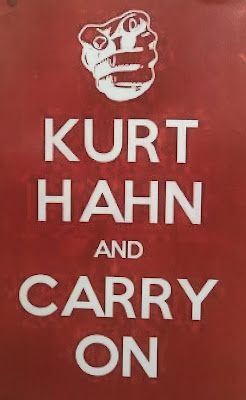Changemaker Education, A New Niche...
If a tree falls in the forest and nobody hears it; does it make a sound?
If a student learns but does not sit their exams; did the learning still happen?
Usually we miss that which we hold most dear but can we honestly say we are hankering after the exam sessions that have been cancelled this Summer? It’s understandable that students feel anxious as they have had this means of validation denied to them. So let's take this opportunity to think where else they may get this validation from. Learning has happened. Our young people are well prepared for their next steps and they have a trail of excellent work and deeds that showcase their passion and progress; their growth, development and maturing.
So, as we adjust to changes thrust upon us, we can ask whether we will be like the caged bird, fearful of what freedom might bring; or whether we can be brave enough to shape a new era of education reform that allows our curriculum to meet the needs of students and the challenges of the age.
At UWC Atlantic our digital pedagogy group has discerned some principles of learning that put change, complexity, adaptability and living for the greater good at the centre of our curriculum. We are prototyping ten Changemaker Education courses that seek to unite the head, hand and heart in a process of rich and authentic, project oriented service learning. Three Units have been running this year (2019/20) and we are adding several more for September.
These principles of learning define a NICHE for learning that is: Networked; Interdisciplinary; Collaborative; Holistic and Experiential.
Networked: Learning that is ‘real world’ and ‘real time’. Partners, often Alumni, offer emerging expertise and insights to our students. The Ocean Systems Unit has ‘Ocean Ambassadors’ as curriculum consultants working alongside our teachers, to open up ways for students to explore our dependence on the sea and how to care for it. Our New Economy Course partners with the Ellen McArthur Foundation to take a circular economy approach to creating value through social innovation.
Interdisciplinary: Rigorous learning drawing on multiple disciplines to gain insights on complex issues. Our Dialogue And Peacemaking Unit integrates emerging academic research from social psychology and international relations to understand conflict and explore dialogic processes at the heart of peacemaking. Our Data for Social Change Unit will develop students’ coding and informatics skills through big data case studies that equip students to make a real difference through small scale data solutions.
Collaborative: Groups of students working together to solve ‘wicked’ problems. Our Dialogue Across Difference Unit draws on the theatre for social change movement to inform student performances derived from their own ethnographic research. Our Making, Breaking, Faking Stories Unit will explore storytelling, oral history, narrative techniques and historiography to help us understand the stories we create and experience and interpret.
Holistic and Hahnian: Honouring our connection with the educational philosophy of Kurt Hahn and seeking an integrative approach that allows students to create positive change in the world. Our Land Sustainability Changemaker Unit uses experiential and transformative pedagogy to ask questions such as: What are the systems at play that explain our current relationship with nature?
Experiential: We want an end to ‘throw away work’. Our Coastal Management Course deepens our relationship with Atlantic Pacific by establishing AP@AC with Atlantic Crest also contributing. This will reinvigorate the seafront with a 200 hour course exploring Search and Rescue and Design Innovation. Students will train as crew for rescue craft and develop design solutions to improve sea rescue.
We are reclaiming an agenda of educational reform for UWC Atlantic, charting new ways that enable students to learn for these times, grow into the world and validate who they are becoming: compassionate citizens, equipped to make positive change in the world.

Comments
Post a Comment